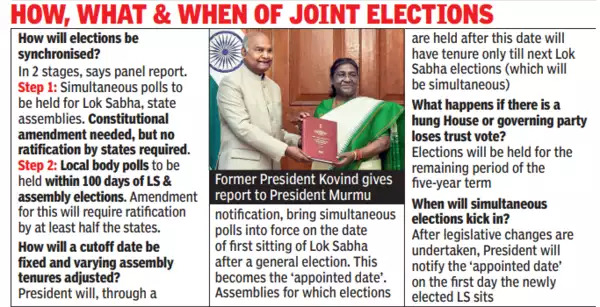The committee has suggested a two-stage process: first, hold state assembly and Lok Sabha elections at the same time; second, organise municipal and panchayat polls within a hundred days.
A uniform electoral roll and electoral picture identity card have also been suggested for use in elections to all three tiers of government. The BJP reaffirmed its support for simultaneous elections to the Parliament, legislatures, and local governments in its manifesto for the 2019 Lok Sabha elections.

Source: Times of India
The party cited the need to “reduce expenditure, ensure efficient utilisation of government resources and security forces and for effective policy planning.” The party had pledged to work with different stakeholders to try and reach an agreement on this matter.
32 of the 47 political parties that presented ideas and opinions to the committee favoured simultaneous elections. Perhaps the last major issue on the BJP’s agenda to be solved before the general election is “one nation, one election.” While a shared voter list is certainly a good idea that will be well received by all, simultaneous polling is not.
Source: NDTV
Elections for parliament and assemblies include different issues and have different dynamics. For example, the AAP won the 2015 and 2020 Assembly elections with a landslide victory, whereas the BJP won all the seats in the Lok Sabha elections held in Delhi in 2014 and 2019.
“One nation, one election” is perceived by some opposition parties and impartial observers as a ruse to obfuscate the issues and encourage voters to support the ruling party in both situations. Equipped with the panel findings, the Centre needs to exert maximum effort to foster consensus over this controversial issue.
What do you think about this? Comment below.

